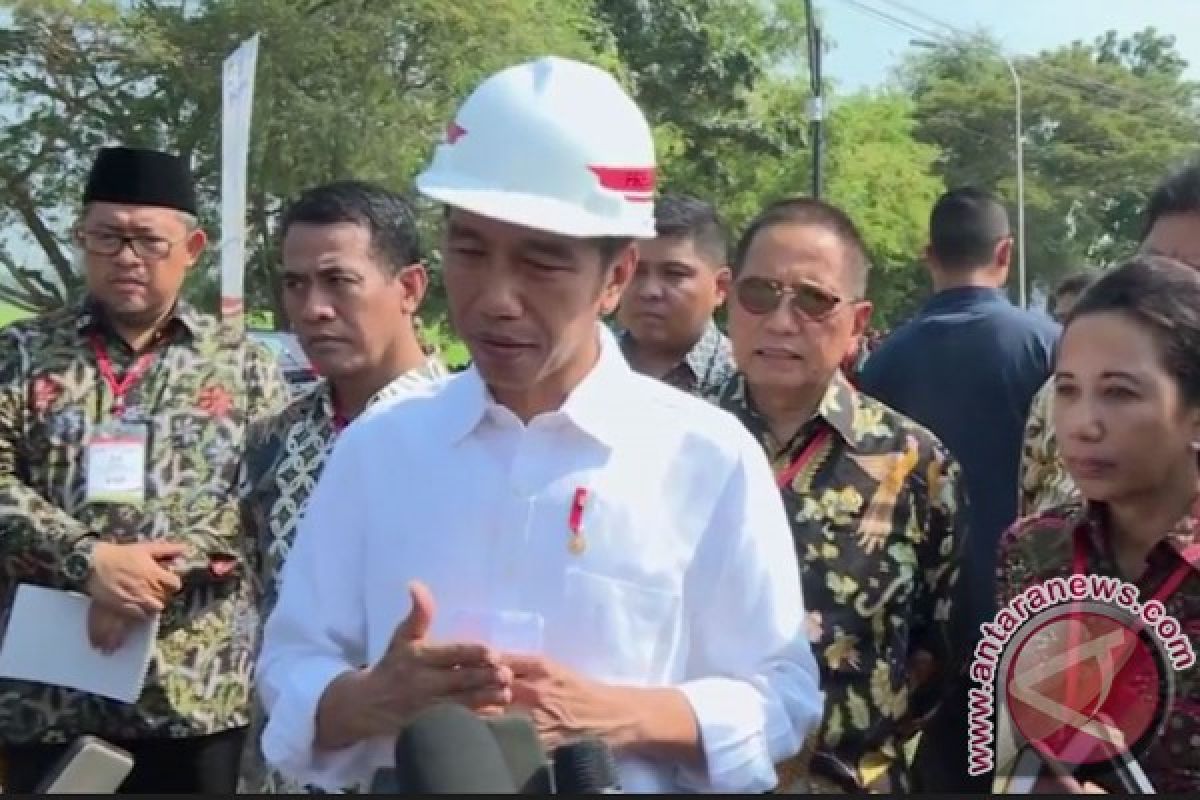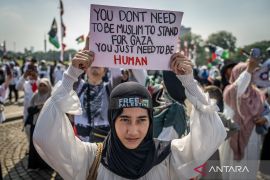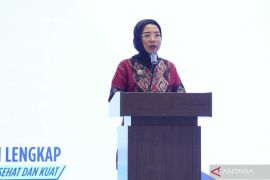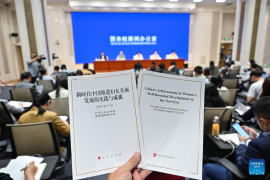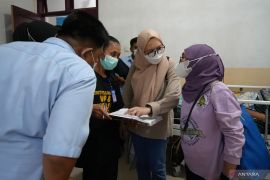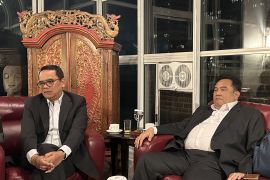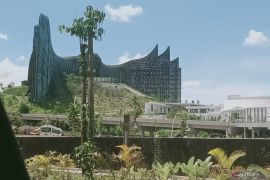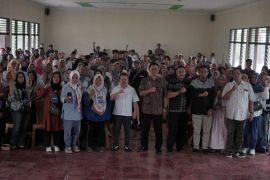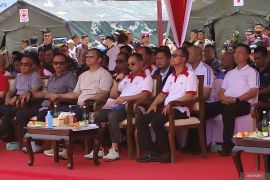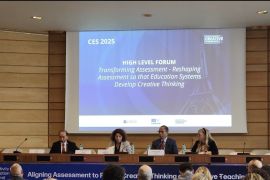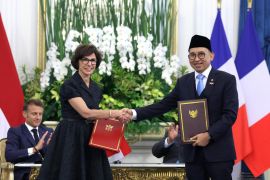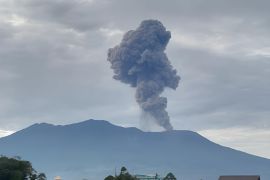"Indeed radicalism did not emerge suddenly. It took a long process," President Joko Widodo said.Jakarta (ANTARA News) - Amid concerns over the spread of radicalism in society and the exposure of universities to radical ideology, the government is doing its best to erode the seeds of radicalism at campuses.
Recent disclosures of activities linked to terrorism at university campuses have heightened concerns, prompting the government to firmly continue its deradicalization efforts to prevent radicalism from spreading further.
"Indeed radicalism did not emerge suddenly. It took a long process," President Joko Widodo noted when his views were sought on the issue during a visit to Majasari Village in Indramayu, West Java, on Thursday (June 7).
According to Widodo, as quoted by the presidential secretariat`s deputy for protocol, press, and media Bey Machmudin, in a written statement, deradicalization efforts had, so far, been made by the government through the National Counterterrorism Agency (BNPT) and through military or police actions.
It is reported that the BNPT has highlighted that seven state universities are allegedly exposed to radicalism.
Moreover, mosques are suspected of having been linked to radical ideology. The Indonesian Ulema Council (MUI) has expressed concern over the existence of some mosques that are suspected of being exposed to radicalism.
Hence, legislators have called on all parties to cooperate in preventing the spread of radicalism in society. It must be contained and prevented from spreading among the people, for which coordination and synergy between the Police and various parties are of paramount importance, according to House Commission III member John Kenedy Aziz.
"It is the police`s job to prevent radicalism from developing in society," Aziz noted in a release on Thursday. Aziz expressed concern over indications of radicalism in university campuses.
Aziz, who is a Golkar Party politician, believes that if radicalism overshadows the ideology of the country, then it would be a deviation from the goal set by universities. Aziz also admitted to persistently advising the people to be wary of the rise in radical understanding that has triggered fear in the community.
Earlier, Vice Chairman of the House of Representatives Commission X Sutan Adil Hendra had emphasized that the government policy should prioritize offering guidance in order to fight radicalism believed to have been exposed to some elements of the campus in the country.
"The coaching aspect should be prioritized in addressing this, so the government should initiate the process of dialog, communication, and awareness among those believed to be affected," Hendra noted on Monday (June 4).
Hendra made the statement in response to the latest study by the BNPT related to seven state universities that are said to have been exposed to radicalism.
Reports said that the seven campuses are the University of Indonesia, Bogor Institute of Agriculture, Bandung Institute of Technology, Diponegoro University, Sepuluh Nopember Institute of Technology Surabaya, University of Airlangga, and University of Brawijaya.
Chairman of the House of Representatives Bambang Soesatyo has encouraged the Ministry of Research and Higher Education and Ministry of Education and Culture to partner with the BNPT to counteract and erode the idea of radicalism in campuses.
Minister of Research, Technology, and Higher Education Mohammad Nasir said his ministry will monitor students` social media to check radicalism on campuses.
"We record data of lecturers and students as well. We keep a record of their cellular phones and track their social media presence," Nasir had remarked here on Monday (June 4).
According to Nasir, the move would neither restrict academic activities nor ignore students` privacy but was aimed at preventing the development of radicalism on campuses.
The ministry had adopted some measures to prevent radicalism in higher education institutions. He said the enforcement of Normalisation of Campus Life/Coordinating Body for Student Affairs (NKK/BKK) had left a vacuum in the students` activity. As a result, he believes that the vacuum was being used by radical groups.
"We conducted some activities, such as state defense and national insight. After the ban on Hizbut Tahrir Indonesia, we worked in coordination with the BNPT," he elaborated.
Minister Nasir said his side was also conducting a background research of the rector candidates to prevent the development of radical understanding in the campus.
"Before the election, we cooperate with the Corruption Eradication Commission (KPK), Financial Transaction Reporting and Analysis Center (PPATK), and State Intelligence Agency (BIN) to investigate the track record and financial transactions of the rector candidates," Nasir noted in Jakarta on Wednesday (June 6).
This step is deemed necessary, so that the elected rector is free from the influence of radical ideology. Hence, election of the rector often gets delayed from the set schedule.
Regarding the allegation that some mosques have also been exposed to radicalism, House Speaker Bambang Soesatyo had urged the Ministry of Religious Affairs to get confirmation on the alleged indications that 40 mosques in Jakarta have been infiltrated.
Soesatyo made the statement in connection with the data from the Spiritual Mental Education Bureau and Muslim Charitable Donations Board that said there are indications of radicalism in some 40 mosques in the capital city.
The House speaker urged Commission VIII of the House to push for investigation by the Ministry of Religious Affairs regarding the information of radicalism at mosques.
The Religious Affairs Ministry also needs to have in place a program for socialization and guidance to prevent acts of terror in houses of worship, he remarked.
In the meantime, the MUI expressed concern over reports of some mosques being suspected of being exposed to radicalism.
Jakarta Vice Governor Sandiaga Uno had earlier stated that sermons were being delivered that divided religious communities, including the spread of radicalism in 40 mosques in the state capital city.
"If the information conveyed by the Jakarta vice governor is true, then we are very concerned about the condition," Vice Chairman of MUI Zainut Tauhid Saadi had remarked on Wednesday (June 7).
(A014/INE)
(T.A014/A/KR-BSR/B003)
Reporter: Andi Abdussalam
Editor: Heru Purwanto
Copyright © ANTARA 2018
